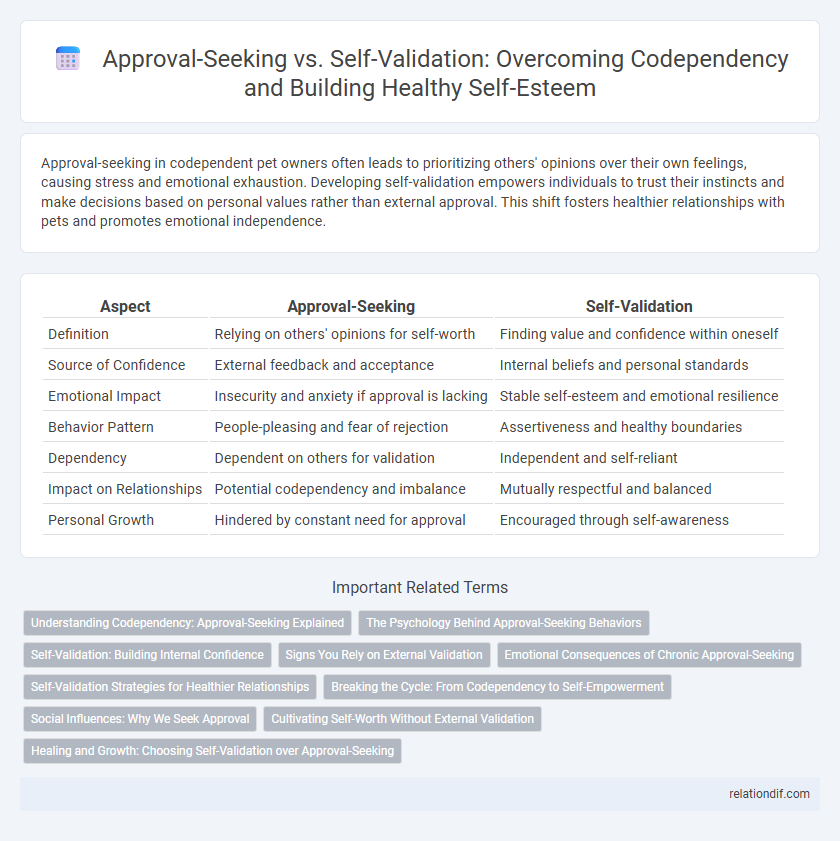Approval-seeking in codependent pet owners often leads to prioritizing others' opinions over their own feelings, causing stress and emotional exhaustion. Developing self-validation empowers individuals to trust their instincts and make decisions based on personal values rather than external approval. This shift fosters healthier relationships with pets and promotes emotional independence.
Table of Comparison
| Aspect | Approval-Seeking | Self-Validation |
|---|---|---|
| Definition | Relying on others' opinions for self-worth | Finding value and confidence within oneself |
| Source of Confidence | External feedback and acceptance | Internal beliefs and personal standards |
| Emotional Impact | Insecurity and anxiety if approval is lacking | Stable self-esteem and emotional resilience |
| Behavior Pattern | People-pleasing and fear of rejection | Assertiveness and healthy boundaries |
| Dependency | Dependent on others for validation | Independent and self-reliant |
| Impact on Relationships | Potential codependency and imbalance | Mutually respectful and balanced |
| Personal Growth | Hindered by constant need for approval | Encouraged through self-awareness |
Understanding Codependency: Approval-Seeking Explained
Approval-seeking in codependency manifests as a compulsive need for external validation to feel worthy, often leading individuals to suppress their true feelings and desires. This behavior contrasts with self-validation, where individuals recognize and accept their intrinsic value independent of others' opinions. Understanding the dynamics of approval-seeking reveals the core codependent patterns that hinder emotional autonomy and healthy relationships.
The Psychology Behind Approval-Seeking Behaviors
Approval-seeking behavior stems from a deep-rooted fear of rejection and low self-esteem, driving individuals to rely heavily on external validation for their sense of worth. Psychological theories highlight that this need for approval often originates from early attachment issues or inconsistent caregiving, leading to codependent patterns. In contrast, self-validation involves internal acknowledgment of one's value, fostering emotional resilience and reducing dependence on others' opinions.
Self-Validation: Building Internal Confidence
Self-validation fosters internal confidence by encouraging individuals to trust their own judgments and feelings, reducing reliance on external approval. This internal affirmation enhances emotional resilience and supports healthier decision-making patterns. Developing self-validation skills creates a foundation for sustainable self-esteem independent of others' opinions.
Signs You Rely on External Validation
Constantly seeking reassurance from others to feel worthy indicates a reliance on external validation, which often results in difficulty making decisions independently. Frequently altering opinions, behaviors, or emotions to align with others' expectations signals approval-seeking tendencies rooted in codependency. Struggling with low self-esteem and experiencing persistent anxiety about others' judgments often accompany a dependence on external validation rather than cultivating self-validation.
Emotional Consequences of Chronic Approval-Seeking
Chronic approval-seeking often leads to heightened anxiety, low self-esteem, and emotional exhaustion as individuals constantly depend on external validation for self-worth. This dependency undermines authentic self-validation, causing persistent feelings of inadequacy and emotional instability. Over time, the inability to self-validate contributes to increased vulnerability to depression and impaired interpersonal relationships.
Self-Validation Strategies for Healthier Relationships
Self-validation strategies foster healthier relationships by encouraging individuals to recognize and affirm their own feelings and needs without relying on external approval. Techniques such as mindfulness, positive self-talk, and setting personal boundaries enhance emotional resilience and promote authentic self-expression. Consistent practice of self-validation reduces codependent behaviors and builds a foundation of mutual respect and emotional independence.
Breaking the Cycle: From Codependency to Self-Empowerment
Breaking the cycle of codependency begins with shifting focus from approval-seeking to self-validation by recognizing intrinsic worth without external affirmation. Developing self-empowerment involves fostering emotional independence, setting healthy boundaries, and practicing affirmations that reinforce personal values. Consistent self-awareness and intentional actions help rewire dependency patterns towards autonomy and resilience.
Social Influences: Why We Seek Approval
Approval-seeking stems from social influences that condition individuals to link self-worth with external validation, often manifesting in codependent behaviors. Social norms, family expectations, and peer pressures create an environment where approval becomes a metric for acceptance and identity. This reliance on external approval undermines self-validation, hindering emotional autonomy and healthy self-esteem development.
Cultivating Self-Worth Without External Validation
Cultivating self-worth without external validation involves recognizing inherent value independent of others' opinions, which directly challenges approval-seeking behaviors common in codependency. Emphasizing internal validation techniques, such as mindfulness and affirmations, strengthens emotional resilience and reduces reliance on external approval. Developing a consistent practice of self-reflection and setting personal boundaries reinforces a stable sense of identity and promotes healthier relationships.
Healing and Growth: Choosing Self-Validation over Approval-Seeking
Healing from codependency involves shifting focus from approval-seeking to self-validation, which strengthens emotional resilience and fosters authentic self-worth. Developing self-validation enhances personal boundaries, reduces anxiety rooted in external opinions, and promotes healthier relationships. This growth process encourages recognizing intrinsic value, empowering individuals to make decisions aligned with their true needs rather than others' expectations.
Approval-seeking vs Self-Validation Infographic

 relationdif.com
relationdif.com